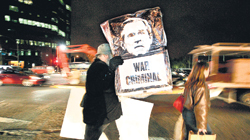
| The rebellion against the war president gathers momentum NEW YORK - When the American electorate rejected most of the ruling party Republicans vying for Congressional seats last November, it sent a clear message to the Bush administration: the continued war in Iraq is turning out to be a monumental disaster to the United States. The numbers are staggering: at last count, the war has cost nearly $450 billion to American taxpayers -- and is rising. The number of US soldiers killed is over 3,000 and the number wounded or incapacitated is about three or four times more. According to Iraqi Health Ministry figures released last week, the war has also taken a toll of some 22,950 Iraqi civilians just last year alone, including killings resulting from sectarian violence prompted by the US invasion more than four years ago.
The mood of the American electorate was best reflected last week at a meeting of the Senate Foreign Relations Committee where the opposition to President's Bush's plans — to increase troop levels in Iraq — came not only from predictable Democrats but also from Republicans in Bush's own party. Senator Christopher Dodd (Democrat from Connecticut) said Bush was living in "a fool's paradise"."If the president did grasp, I think, the sad extent of (his) failure, I sincerely doubt he would have ordered yet more troops into Iraq." He also accused the Bush administration of using American troops as "cannon fodder" in Iraq. The rising Congressional opposition has been prompted primarily by Bush's announcement last week to increase US troops by an additional 20,000 — to a total of about 160,000 troops — and contribute to what is clearly a losing war in Iraq. When US Secretary of State Condoleezza Rice appeared before the Senate Foreign Relations Committee last week to defend Bush's decision, she faced the political fury of both Democratic and Republican Senators. Senator Chuck Hagel (Republican of Nebraska) was blunt when he told Rice: "I have to say, Madame Secretary, that I think this speech given last night by this president (announcing rising troop levels) represents the most dangerous foreign policy blunder in this country since Vietnam, if it's carried out. I will resist it." If partisanship is a key factor in politics, the rising resistance to the war is understandble when it comes from the opposition Democratic Party. But now there seems to be a growing rebellion in the ranks of Bush's own party to a major foreign policy decision — a rebellion which, by most accounts, is rare. Lining up against Bush were three more Republican Senators: George Voinovich of Ohio, Chuck Hagel of Nebraska and Richard Lugar of Indiana. "I am sceptical that a surge of troops will bring an end to the escalation of violence and the insurgency in Iraq," said Voinovich, "Many of the (US army) generals that have served there have said they don't believe additional troops will be helpful." Bush has appointed a new overall US commander in Iraq: Lt. Gen David Petraeus, an appointment which prompted one Senator to remark that Bush had been shopping around for a general who subscribes to his views. The outgoing general George W. Casey has been wary about increasing troop levels in Iraq. The surge in US troops also comes at a time when Britain, one of America's faithful allies, has decided to withdraw at least 2,600 of its troops, from its current level of 7,100. The proposed withdrawal, if implemented, will be another blow to the Bush administration. Meanwhile, there has also been growing opposition to the continued war among peace activists who are demanding a total withdrawal of troops, which could also cause the complete collapse of a country torn by civil war. The questions lingering in the minds of most Americans are: Is Bush naive enough to think that a surge in troops is going to quell the rising insurgency in Iraq, particularly at this late stage? Or is he stubborn enough not to admit that his misconceived war in Iraq is heading towards one of the major foreign policy blunders of his administration? Even as he falters in Iraq, there is a grassroots movement calling for the impeachment of Bush (www.impeachbush.org). A full page ad in Friday's New York Times says over 810,000 people have already signed a petition demanding the US Congress impeach Bush for "the illegal war of aggression Bush has launched against Iraq (which) has killed hundreds and thousands of Iraqis, and killed and wounded tens and thousands of US soldiers." The ad also said: "He set up a worldwide network of secret prisons, where torture has become the norm. He gave himself the power to wiretap, open the mail of, search, and indefinitely detain any American." The punch line in the ad reads: "Each second this president spends in office is harmful to the interests and values of the American people and the Constitution. It is time to take a stand and let the world know that he is not acting with our consent." |
|| Front
Page | News | Editorial | Columns | Sports | Plus | Financial
Times | International | Mirror | TV
Times | Funday
Times || |
| |
Copyright
2007 Wijeya
Newspapers Ltd.Colombo. Sri Lanka. |
